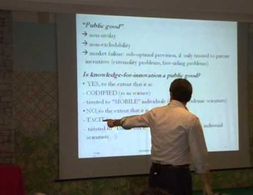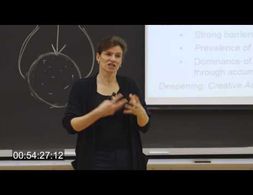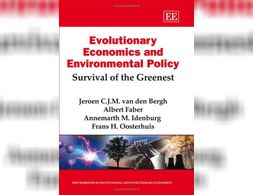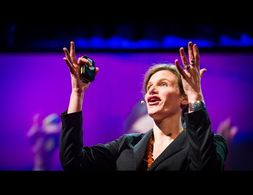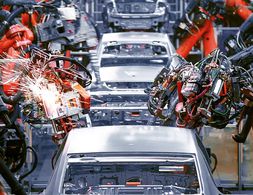✕
74 results
The Lecturer Prof. Francesco Lissoni presents basic concepts of the Economics of Innovation. Firstly, he distinguishes between invention, innovation and diffusion and relates innovation to economic growth. Subsequently, he elucidates learning and network effects.
What is innovation, what drives innovation and the process that differentiates firms? What is competition and what kind of dynamics lie behind the differences between firms and their innovative activities? Mariana Mazzucato elaborates on those questions from an evolutionary economics' and Schumpeterian perspective. The slides of her lecture are not visible, hence some visualizations can't be followed.
The article discusses the state’s influence on innovation through financial support and provides examples how the state could receive a financial share of successful enterprises in order to keep on driving innovation in the future.
The Commentary explains the circular value chain and innovation potential along it. Focusing on Israel, examples on how cross-industry collaboration can help supporting a successful positioning in a (Digital) Circular Economy are presented.
The Learning Economy and the Economics of Hope' brings together the most important contributions by an expert on policies, management and economics of innovation and knowledge. It offers original insights in processes of innovation and learning and it draws implications for economic theory and public policy. It introduces the reader to important concepts such as innovation systems and the learning economy.
Evolutionary economics focuses on economic change. Hence processes of change such as growth, innovation, structural and technological change, as well as economic development in general are analysed. Evolutionary economics often gives emphasis to populations and (sub-)systems.
This study offers a unique evolutionary economics perspective on energy and innovation policies in the wider context of the transition to sustainable development. The authors include: - an analysis of the environmental policy implications of evolutionary economics - a critical examination of current Dutch environmental and innovation policies and policy documents - systematic evaluation of three specific energy technologies, namely fuel cells, nuclear fusion and photovoltaic cells, within the evolutionary-economic framework.
This course will introduce key concepts, theories and methods from socioeconomics. The first part of the course, will deal with the main economic actors and how their interactions are governed. Markets are seen as sets of social institutions. Institutions shape how consumers, firms and other economic actors behave. While it is difficult to understand how novelty emerges, we can study the conditions that are conducive to innovation. We will review how economic performance, social progress and human wellbeing are measured and what progress has been made. In the second part of the course, we will study a specific macroeconomic model that accounts for biophysical boundaries and inequality.
One of the pluralist theories which has gained prominence following the 2008 financial crisis is Hyman Minsky and his Financial Instability Hypothesis (FIH). Minsky was unique in viewing balance sheets and financial flows as the primary components of capitalist economies, and his focus on the financial system meant he was well-equipped for foresee a crisis much like 2008. Although he died long before 2008 his framework anticipated many of the processes which led to the crash, particularly increased risk-taking and financial innovation which would outstrip the abilities of regulators and central banks to manage the system.
In this Ted Talk, Mariana Mazzucato argues against the juxtaposition of the state and entrepreneurial activities. By presenting examples of her research on the relation between innovation and (inclusive) growth, she shows how many innovations were led by states' initiatives. Mazzucato confronts the liberal narrative of the a state that merely provides the frame for the market.
UBC's Henry Siu, a professor at the Vancouver School of Economics, speaks about innovation in economics, technological progress and what it means for the fut...
Economic development is a process of continuous technological innovation and structural transformation. Development thinking is inherently tied to the quest for sustainable growth strategies. This book provides a neoclassical approach for studying the determinants of economic structure and its transformation and draws new insights for development policy.
Uncertain Futures considers how economic actors visualize the future and decide how to act in conditions of radical uncertainty. It starts from the premise that dynamic capitalist economies are characterized by relentless innovation and novelty and hence exhibit an indeterminacy that cannot be reduced to measurable risk.
In this essay the author elaborates on the EU's perspective on the fast growing sector of the platform economy.
This text provides an easy to understand introduction to complexity economics for non-specialist audiences such as bachelor's students.
Complexity economics focuses on interactions and interdependencies between individuals and structures in economic systems. Those are systems of organised complexity. High importance is given to the analysis of networks.
In this overview paper, Laura Porak reviews the history of industrial policy in the European Union before the background of a Cultural Political Economy approach.
What made the false assumption that saving the economy at all cost during a pandemic so popular? This paper discusses different pathways through the COVID-19 pandemic at national and international level, and their consequences on the health of citizens and their economies.
Institutional economics focuses on the role of social institutions in terms of laws or contracts, but also those of social norms and patterns of human behaviour that are connected to the social organisation of production, distribution and consumption in the economy.
An essay of the writing workshop on contemporary issues in the field of Nigerian economics: The adverse effect of climate change is overwhelming, not just in Nigeria but globally. Global warming is the result of hostile human activities that have impacted the environment negatively. This is the principal variable the government should tackle through practical innovations such as the acceptable implementation of Adaptation Policies and also through the adequate implementation of environmental tax. These will enhance pro-environmental behaviour which is fit for socio-political and economic activities for sustainability.
This paper is a product of an online workshop held in Nigeria on the topic Unemployment: Policy Review and Recommendations. It explores the various unemployment policies introduced by the Nigerian Government and analysis how effective they are and suggests some practicable solutions to solving unemployment problems in the country.
The workshop was organized by Rethinking Economics The Uploaders (RETU) as part of the project Solving the Major Economic Problem in Nigeria (SMEPN), an output of the Global Pluralist Economics Training (GPET).
More details here: https://www.retheuploaders.org/programs/SMEPN
Recovery from the Covid-19 crisis provides a chance to implement economic measures that are also beneficial from environmental and social perspectives. While ‘green’ recovery packages are crucial to support economies tracking a low-carbon transition in the short-term, green measures such as carbon pricing are also key to improving welfare in the long-term. This commentary specifies the need for carbon pricing, outlines its implications for our everyday lives, and explains how it works alongside value-based change in the context of climate action and societal well-being.
The Microeconomics of Complex Economies uses game theory, modeling approaches, formal techniques, and computer simulations to teach useful, accessible approaches to real modern economies.
Austrian economics focuses on the economic coordination of individuals in a market economy. Austrian economics emphasises individualism, subjectivism, laissez-faire politics, uncertainty and the role of the entrepreneur, amongst others.
A review of:
[1] Intermediate Microeconomics, H.R. Varian
[2] Mikrooekonomie, R.S. Pindyck, D.L. Rubinfeld
[3] Grundzuege der mikrooekonomischen Theorie, J. Schumann, U. Meyer, W. Stroebele
The module is designed to first present some of the main schools of thought from a historical and methodological perspective. Each week we explore and critically assess the main tenants of each school of thought. In the second part of the module we link history of economic thought and methodology to a specific and contemporary economic question. The second part allows you to engage with current economic issues with an awareness of methodology and methodological differences and with some knowledge of the history of economics.
Introduction Economics is by necessity a multi paradigmatic science Several theoretical structures exist side by side and each theory can never be more than a partial theory Rothschild 1999 Likening scientific work to the self coordinating invisible hand of the market Michael Polanyi cautioned strongly against centralized attempts to steer …
The term "de-risking" can be seen as one element of a strategy aimed at discursively reframing the trade policy confrontation with China. This confrontation has mainly been driven by the US in recent years and received initially cautious, but later growing support from the EU.
Finance at the Threshold offers a unique perspective from an English economic and monetary historian. In it the author asks: Why did the banks stop lending to one another, and why now? Was it merely a matter of over-loose credit due to the relaxation of traditional prudence, or did global finance find itself at its limits?
Some economic events are so major and unsettling that they “change everything.” Such is the case with the financial crisis that started in the summer of 2007 and is still a drag on the world economy. Yet enough time has now elapsed for economists to consider questions that run deeper than the usual focus on the immediate causes and consequences of the crisis.
Towards a post-work future: a necessary agenda to reconcile feminist & ecological concerns with work
In this essay the author outlines the basis for embracing a post-work agenda, rooted in an emancipatory potential from the domination of waged work, which could help answer both feminist and ecological concerns with work.
As seen with the United Nations significant promotion of the Sustainable Development Goals (SDGs) in the past few years, the issue of global development is of growing concern to many international organizations. As humanity continues to become more interconnected through globalization, the inequalities and injustices experienced by inhabitants of impacted countries becomes increasingly clear. While this issue can be observed in the papers of different types (e.g., different schools of thought) of economists throughout the world, the work of behavioral and complexity economists offer a unique, collaborative perspective on how to frame decisions for individuals in a way that can positively reverberate throughout society and throughout time.
We use cookies on our website. Click on Accept to help us to make Exploring Economics constantly better!

